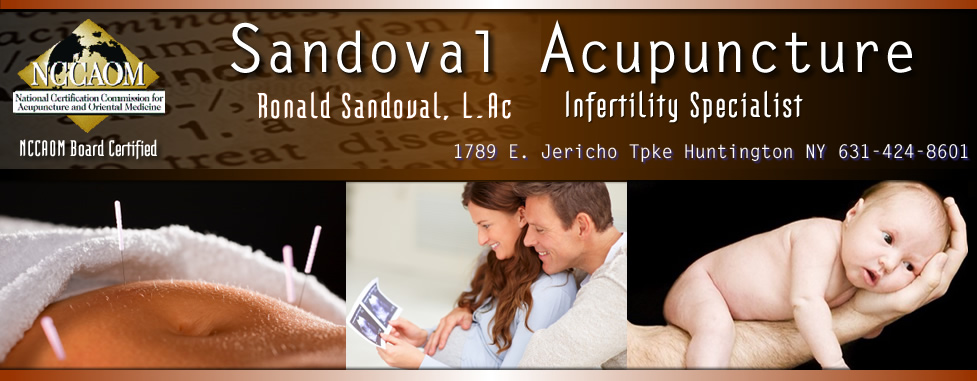
|
Can acupuncture help if my infertility is due to Endometriosis? | Acupuncture and IVF FAQ's |
Read what others have to say about their experience with Ron. |
|
|
|
|
|
PCOS is an endocrine disorder, which has wide ranging effects on both fertility and general health. After many years of study and experience with the disease, Dr. Sandoval believes that a balanced diet, proper nutrition, exercise, and a healthy lifestyle can contribute greatly to the treatment of PCOS. He prescribes the following changes for the enhancement of fertility and the path to greater health and well-being:
- Avoid alcohol consumption. Alcohol can lead to a disturbance of hormonal balance.
Home | Success Stories | Acupuncture | Herbal Medicine | Hypnosis | Massage Therapy | Moxabustion | Endometriosis | High FSH & Egg Qualtiy | Menstruation | Menopause | Polycystic Ovarian Syndrome | Research | Forms | Acupuncture FAQ's | Acupuncture in IVF | Contact Ron Sandoval
Ronald Sandoval, LAc (Best Acupuncturist on Long Island 2010, Fertility Specialist Huntington Long Island NY
Fertility & Acupuncture Long Island | Fertility Specialists New York City
Long Island Acupuncture and fertility clinics | Long Island Infertrility Specialists | Acupuncturists Long Island, | endometriosis and acupuncture long island,
endometriosis and acupuncture Huntington, Huntington Acupuncture and fertility clinics | Acupuncturists Huntington
Huntington Infertrility Specialists | Fertility & Acupuncture Huntington
Huntington Acupuncture | Acupuncture Huntington | Acupuncturists Huntington | Huntington Acupuncturists
Huntington Infertility | IVF Huntington | Fertility Clinics Huntington | Infertility Acupuncturists Huntington
All Rights Reserved.
© 2009 Ron Sandoval, L.Ac
Unauthorized use of any text, graphics, music, or art on this website,
is prohibited and is a violation of copyright law.
Huntington Acupuncture, Huntington Infertility, Huntington Fertility Clinics, Huntington Acupuncturists, Huntington Fertility Specialists,
Acupuncture Suffolk County | Acupuncture Nassau County | Acupuncture Queens County | Acupunctue New York City | Acupuncture Brooklyn NY | Acupuncture Bronx NY
Infertility specialist Suffolk County | Infertility specialist Nassau County | Infertility specialist Queens County | Infertility specialist New York City | Infertility specialist Brooklyn NY | Infertility specialist Bronx NY
Long Island Acupuncture | Acupuncture Long Island | Acupuncturists Long Island | Long Island Acupuncturists
Sandoval Acupuncture treats patients with Acupuncture throughout various areas of Long Island such as:
Acupuncture Bayville NY | Acupuncture and IVF Fertility Clinics Cold Spring Harbor Long Island NY 11724 | Acupuncture and Infertility Specialists Commack Long Island NY 11725 | Acupuncturists Deer Park NY 11729 | Acupuncture and Fertility Clinics Dix Hills NY 11746 | Acupuncture East Meadow NY 11554 | Acupuncture East Northport NY 11731 | Acupuncture East Norwich NY 11732 | Acupuncture Farmingdale NY 11735 | Acupuncture Freeport NY 11520 | Acupuncture Treatments Garden City NY 11530 | Acupuncture and IVF Glen Cove Long Island NY 11542 | Acupuncture Glen Head NY 11545 | Acupuncture Babylon NY 11704 | Acupuncture Bayshore NY 11706 | Acupuncture and In Vitro Islip Long Island NY | Acupuncture Hampton Bays NY | Acupuncture Hamptons NY | Acupuncture Specialists West Hampton NY | Acupuncture Hampton Bridge NY | Acupuncture Great Neck NY | Acupuncture Hicksville NY 11801 | Endometriosis and Acupuncture Huntington Station NY 11746 | Acupuncture and Infertility Jericho Long Island NY 11753 | Acupuncture Lawrence NY 11559 | Acupuncture Little Neck Queens County NY 11362 | Acupuncture Locust Valley NY 11560 | Acupuncture Long Beach NY 11561 | Acupuncture Lynbrook NY 11563 | Acupuncture Specialists Manhasset NY 11030 | Acupuncture and Infertility Massapequa NY 11758 | Acupuncture Merrick NY 11566 | Acupuncture Melville NY 11750 | Acupuncture Mineola NY 11501 | Acupuncture and fertility Muttontown NY 11773 | Acupuncture New Hyde Park NY 11040 | Acupuncture and In Vitro Fertilization Northport Long Island NY 11768 | Acupuncture Oceanside NY 11572 | Fertility and Acupuncture Old Brookville Long Island NY 11545 | Acupuncture Old Westbury NY 11568 | Acupuncture Oyster Bay NY 11771 | Acupuncture Oyster Bay Cove NY 11771 | Acupuncture Plainview NY 11803 | Acupuncture Port Jefferson NY 11776 | Acupuncture Port Washington NY 11050 | Acupuncture Treatments Roslyn NY 11576 | Acupuncture Roslyn Heights NY 11577 | Acupuncture Sea Cliff NY 11579 | Acupuncture helps with menopause Seaford NY 11783 | Acupuncture Searingtown NY 11770 | Acupuncture Smithtown NY 11787 | Acupuncture Stony Brook NY 11790 | Acupuncture Syosset NY 11791 | Acupuncture Valley Stream NY 11580 | Acupuncture Wantagh NY 11793 | Acupuncture Woodbury NY 11797
Acupuncture Elmont NY | Acupuncture Ozone Park NY | Acupuncture Bayside NY | Acupuncture Rego Park NY | Acupuncture Woodside NY | Acupuncture Elmhurst NY | Acupuncture Forest Hills NY Acupuncture Flushing NY 11354 | Acupuncture Jackson Heights NY 11372 | Acupuncture Richmond Hill NY 11418 | Acupuncture Fresh Meadows NY | Acupuncture Queens Village NY | Acupuncture Astoria NY | Acupuncture Woodhaven NY | Acupuncture Sunnyside NY | Acupuncture Long Island City NY | Acupuncture and Infertility Specialists Kew Gardens NY | Acupuncture Jamaica NY | Acupuncture South Ozone Park NY


